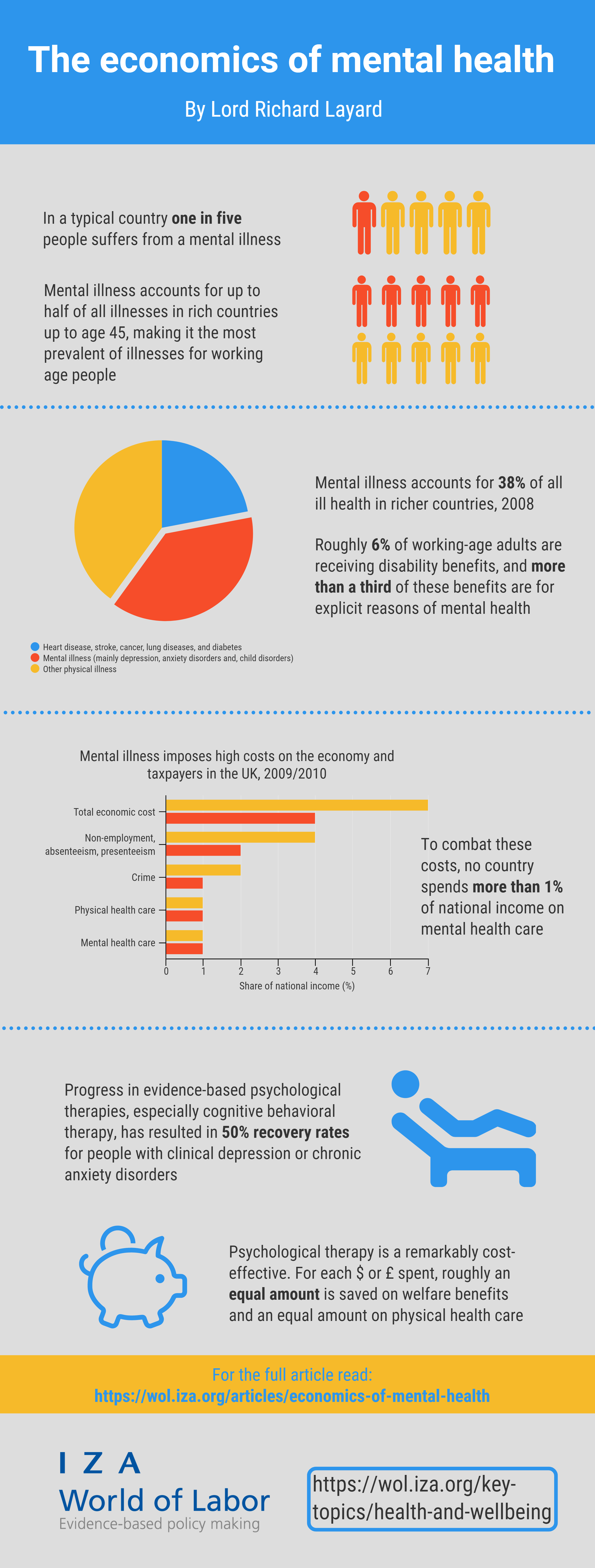NEW REPORT: The economics of mental health

Just as Prime Minister Theresa May has announced a number of new policies aiming to improve mental health care IZA World of Labor publishes today a timely new report by the economist Sir Richard Layard on the economic costs of mental illness
Mental illness accounts for half of all illness up to age 45 in rich countries, making it the most prevalent disease among working-age people. Mental illness costs billions in welfare payments and lost taxes. Economist and former adviser to Tony Blair and Gordon Brown, Richard Layard of the London School of Economics shows that providing evidence-based therapies for people with a mental illness should be at the heart of public policy making. And this policy would more than pay for itself.
People with a mental illness are less likely to be working, and, if working, are more likely to be out sick or working below par. If mentally ill people worked at the same rate as the rest of the population, total employment would be more than 4% higher, boosting production and tax revenues. “Presenteeism” is another cost of mental illness—the less effective work done when a person is suffering from a mental illness. By a conservative analysis, the combined effect of non-employment, absenteeism, and presenteeism in the UK reduces national income (gross national product) by 7%— almost as much as most countries spend on education. Mental illness also imposes costs on physical health care. People who have mental health problems use 60% more physical health care services than those who are equally ill but without mental health problems. This amounts to a massive extra cost (for example, £10 billion in England). Finally, many crimes are mental health-related and crime has a clear economic cost: ca 2% of national income.
Despite the considerable costs, no country spends more than 1% of national income on mental health care. For example, the UK spends just 1% of national income to reduce the expense of conditions that cost the country 7%. Progress in evidence-based psychological therapies has resulted in 50% recovery rates for people with clinical depression or chronic anxiety disorders and substantial improvements for others. Yet, in most countries, only a tiny fraction of people receive these therapies—even though providing them involves no net cost to public funds. Layard shows that if savings on welfare benefits, lost taxes, and physical health care are included in the calculations, the treatments pay for themselves, twice over.
Layard concludes: “Psychological therapy is a remarkably good bargain. Yet health care commissioners and insurers in the UK, the US, and elsewhere regularly see psychological therapy as an easy area to cut. They need to know that every time they do this, it costs rather than saves money.”
Media Contact:
Please contact Anna von Hahn for more information or for author interviews: anna.vonhahn@bloomsbury.com or +44 7852 882 770
Notes for editors: IZA World of Labor (http://wol.iza.org) is a global, freely available online resource that provides policy makers, academics, journalists, and researchers, with clear, concise and evidence-based knowledge on labor economics issues worldwide. The site offers relevant and succinct information on topics including diversity, migration, minimum wage, youth unemployment, employment protection, development, education, gender balance, labor mobility and flexibility among others.
Established in 1998, the Institute of Labor Economics (www.iza.org) is an independent economic research institute focused on the analysis of global labour markets. Based in Bonn, it operates an international network of about 1,300 economists and researchers spanning more than 45 countries.